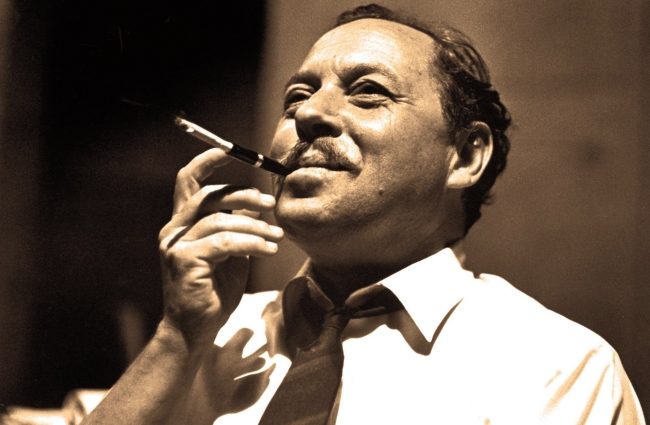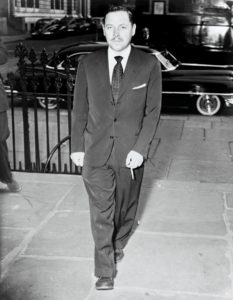
Tennessee Williams was one of the foremost playwrights in the 20th century. He wrote close to 40 plays, 70 one-act plays, and several screenplays, achieving great success with The Glass Menagerie (1944), A Streetcar Named Desire (1947; Pulitzer Prize winner), Cat on a Hot Tin Roof (1955; Pulitzer Prize winner), Sweet Bird of Youth (1959), and The Night of the Iguana (1961). He authored two novels, The Roman Spring of Mrs. Stone (1950) and Moise and the World of Reason (1975). In addition, he wrote a memoir, essays, around two dozen short stories, and two books of poetry, In the Winter of Cities (1956) and Androgyne, Mon Amour (1977). So, what is his connection to Appalachia? Not only was Tennessee Williams himself Appalachian (according to the Appalachian Regional Commission’s county designations), his ancestors called the region home beginning in the 1700s.
Tennessee Williams’s actual name was Thomas Lanier Williams III, and he was born in Columbus (Lowndes County), Mississippi, on March 26, 1911 (d. 1983), to Cornelius Coffin Williams and Edwina Dakin Williams. He claims “life was pleasant – gracious and full of imaginings”1)Williams, Tennessee. 1986. Conversations With Tennessee Williams. Edited by Albert J. Devlin. Jackson: University Press of Mississippi. p. 16 in Columbus, and he often spoke of those times in a dreamy nostalgia. His father was a traveling salesman, and, when he received a big promotion, the family moved to St. Louis, Missouri, when Williams was a teenager. The move, along with his father’s psychological abuse and dissatisfaction with his son, was a disaster for the playwright. After a stint in the hospital, he reevaluated his life and chose Tennessee as his new given name, chiefly because his father and a plethora of patriarchs were born there. As a matter of fact, Williams “descended from ancestors who were distinguished in the history and founding of the state of Tennessee.”2)Leverich, Lyle. 1995. Tom: The Unknown Tennessee Williams. New York: Crown Publishers, Inc., p. x This lineage is the focus for this post. Though the focus here is the male Williams line, the playwright’s matriarchal line is awesome as well. I plan on introducing them in a future post (or posts).
First, I must say in my research of Williams’s ancestors, I came across several contradictory dates, relations, etc. (Several persons, for example, named Joseph or John or Nathaniel, etc.) And I have had a time, let me tell you, deciphering, picking apart, and matching up facts. I’ve relied on the site Find-A-Grave as a starting point for my own genealogical research and have found the connections, for the most part, to be spot on. But through this experience, I’ve come to realize the site isn’t always factual. Given that, I have done my best to present the facts as I have found them. If I’m uncertain, I’ve said so and/ or provided a source for the reader’s further review. According to most sources, Tennessee Williams’s lineage begins with John Williams Sr., then his son Nathaniel Williams. Other sources I came across seemed to conflate several John Williamses and Nathaniel Williamses. In order to present accurate information (or as close to accurate as I hope), I would need to see physical documents. So, instead, I’m beginning with Tennessee Williams’s fourth generation great grandfather.

Colonel Joseph Williams (1748-1827) was also known as the “Duke of Surry” and/or “Joseph of Shallow Ford,” the latter used mostly to distinguish him from a cousin who was also named Joseph Williams. Col. Joseph Williams’s father died when he was fifteen years old so, he ventured off to North Carolina to work as a clerk for a store run by said cousin. Joseph was a Revolutionary War hero, serving the Whig Army as Lt. Colonel from 1775-1776 and as Colonel from 1776-1783, Surry County, NC Militia. He was known to be “exceedingly obnoxious” to the British, so much so that Tory sympathizers planned to kill him. The plot was intercepted and at least two of those sympathizers were executed.3)Special Staff of Writers. 1919. History of North Carolina Vol. 6 North Caroliina Biography. Chicago: The Lewis Publishing Company., p. 243
Some sources report some strange marriage shenanigans for Joseph. Find-A-Grave, for example, lists that he was married to two sisters, Sarah Lanier and Rebecca Lanier, presumably at the same time, but this listing seems to be in error. The two Lanier sisters did marry Williams men. Col. Joseph Williams married Rebecca Lanier (sometimes spelled Rebekah) on September 11, 1772. He often signed his name as “Jr.” to distinguish himself from his cousin Joseph Williams. The (thorough and reliable) genealogical website Family Search lists the groom as Joseph Williams Jr. Further, the site lists Sarah Lanier as marrying cousin Joseph Williams on January 3, 1766. The book Colonial Granville and Its People: Loose Leaves from “The Lost Tribes of North Carolina,” compiled and edited by Worth S. Ray, states that after the cousin’s death, Sarah married Robert Williams, Colonel Joseph’s brother. 4)Ray, Worth S. 1956. Colonial Granville County and Its People: Loose Leaves from “The Lost Tribes of North Carolina”. Baltimore: Southern Book Company. p. 238 It’s okay if your head is swimming right now. Colonel Joseph Williams and Rebecca Lanier Williams had at least ten children. One of these children was John Williams (1778-1837), Tennessee Williams’s third generation great grandfather.
John Williams was a character. He was considered dapper, handsome, and ambitious. He studied law in Salisbury, North Carolina, then moved to Tennessee, passed the bar, and practiced law in Knoxville. He married Melinda White, daughter of James White, Knoxville’s main founder.5)Knoxville was named after George Washington’s Sec. of War, Henry Knox. The marriage was reportedly “more of a merger than a marriage.”6)Uncertain. 2000. “Descendants of Adam White.” tngenweb.org. Feb 1. p. 84 The families were highly influential in the area. John is described thusly:
Williams was something of a renaissance man with many interests. He served as a trustee of East Tennessee College, later the University of Tennessee, for 25 years. From 1815 to 1823 he served in the U.S. Senate from Tennessee, and became highly respected for his integrity and ability. He practiced law and exchanged letters with some of the brightest minds in the nation at the time, including Henry Clay, John Quincy Adams, John C. Calhoun, Daniel Webster and James K. Polk. Williams was also a dapper dresser. Dolly Madison called him the ‘Chesterfield of the Senate,’ referring to the always elegantly-dressed English Lord Chesterfield.7)Uncertain. 2000. “Descendants of Adam White.” tngenweb.org. Feb 1. p. 84
Before all the above, John Williams served his country in the military. He was “Captain of U.S. Regulars in the War of 1812. Colonel of East Tennessee Mounted Volunteers during the Seminole War, Colonel of the 39th U.S. Infantry, 1813 and served under Gen. Andrew Jackson at the Battle of Horseshoe Bend.”8)Williams, Scott K. nd. “Early Descendants of John Williams, “The Wealthy Welshman”.” kitwilliams.com. Accessed June 2021. He often “gallantly came to the help of” General Jackson, who found himself in several “precarious situation[s] . . . in the wilderness.”9)Heiskell, S. G. 1918. Andrew Jackson and Early Tennessee History. Knoxville: Ambrose Printing Company. p. 355 Jackson also had troubles within his own ranks. Indeed, Jackson sent a letter to Major William B. Lewis stating: “I am truly happy in having the Colonel (Williams) with me. His regiment will give strength to my arm and quell my mutiny.”10)Heiskell, S. G. 1918. Andrew Jackson and Early Tennessee History. Knoxville: Ambrose Printing Company.p. 358
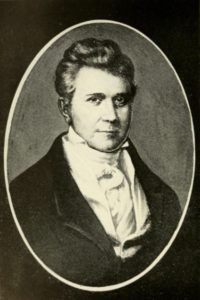
Colonel John Williams was considered for John Quincy Adams’s Secretary of War. Henry Clay, however, presented Adams with a conundrum. They needed New York’s support, so Clay convinced the president to give the cabinet position to someone from that state.11)Heiskell, S. G. 1918. Andrew Jackson and Early Tennessee History. Knoxville: Ambrose Printing Company. p. 356 Adams appointed Williams as the Charge d’Affaires to the Central American Federation.12)Williams, Scott K. nd. “Early Descendants of John Williams, “The Wealthy Welshman”.” kitwilliams.com. Accessed June 2021.
After the war, the relationship between Williams and Andrew Jackson was strained. Mostly due to politics. Jackson ran against him for the U.S. Senate seat. For himself, Williams was more than perturbed that Jackson didn’t “adequately” recognize his service – and “the services of his regiment” in official reports to Tennessee Governor William Blount.13)Heiskell, S. G. 1918. Andrew Jackson and Early Tennessee History. Knoxville: Ambrose Printing Company. p. 359 With the backing of political bigwigs, Jackson defeated Williams “by seven votes.”14)Heiskell, S. G. 1918. Andrew Jackson and Early Tennessee History. Knoxville: Ambrose Printing Company. p. 359 He continued to serve in state politics and was very much revered.
A family legend exists about his death. Williams was traveling to Washington to visit his son, newly elected to Congress. He stopped at one point “to snap off a switch to use in prodding his horse.”15)Uncertain. 2000. “Descendants of Adam White.” tngenweb.org. Feb 1. As he reached for the branch, he was bitten by something – “a scorpion, snake or bee” – and later died. He is buried at the First Presbyterian Church Cemetery in Knoxville, Tennessee. He and his wife, Melinda, had several children. John Williams (1818-1881) is among them. He was Tennessee Williams’s great-great grandfather.
Not much has been written about John Williams. He supported the Union during the Civil War and was an Assistant Vice President in the East Tennessee Convention,16)East Tennessee Convention. 1861. Proceedings of the E. T. Convention. Knoxville/ Greeneville: H. Barry’s Book and Job Office, May – June May 30-31/ June 17. a group of delegates who declared secession unconstitutional and attempted to split off East Tennessee from the rest of the state. During the war, he also assisted in brokering peace in at least one battle.17)Humes, Thomas William. 1888. The Loyal Mountaineers of Tennessee. Knoxville: Ogden Brothers & Company. p. 347 I have read other sources that claim this John Williams was involved with politics, but not to the impressive extent of his forefathers. He married Rhoda Campbell Morgan and they had a handful of children. He is buried at the Old Gray Cemetery in Knoxville, Tennessee. One of their offspring was named Thomas Lanier Williams II (1849-1908), Tennessee Williams’s grandfather and namesake.
Thomas Lanier Williams II’s political career was not so successful. He ran for governor in Tennessee several times but lost each time.18)Leverich, Lyle. 1995. Tom: The Unknown Tennessee Williams. New York: Crown Publishers, Inc. p. 29 He was handsome, a prominent lawyer in Knoxville, and was at one time Tennessee’s state railroad commissioner.19)Leverich, Lyle. 1995. Tom: The Unknown Tennessee Williams. New York: Crown Publishers, Inc. p. 29 He married Nancy Isabelle Coffin and they had around three children. She contracted tuberculosis and died in 1884. After her death, Thomas became quite the womanizer. He also squandered the family’s money on various pursuits. He is buried at the Old Gray Cemetery in Knoxville. One of the couple’s children was named Cornelius Coffin Williams (1879-1957), Tennessee Williams’s father.
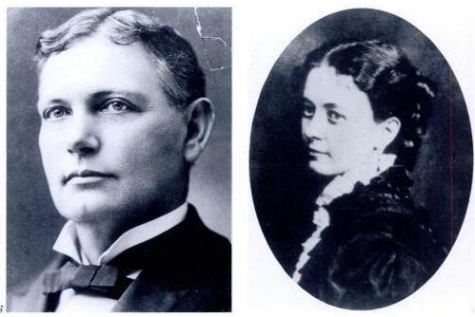
Cornelius Coffin Williams took the family motto, Cognoscy-Occasionrn, to heart: “Know Your Opportunity – Seize It.”20)Leverich, Lyle. 1995. Tom: The Unknown Tennessee Williams. New York: Crown Publishers, Inc. p. 32 He was a “go-getter” of sorts, or, better said, a man “on the go.” He had behavior issues when he was younger and was eventually sent to Bell Buckle Military Academy, where he found the place so restrictive and “restraining,” that he bucked authority at every turn and often ran away before he was sent packing.21)Leverich, Lyle. 1995. Tom: The Unknown Tennessee Williams. New York: Crown Publishers, Inc. p. 29 He served as 2nd Lieutenant in the Spanish-American War. There, he caught Typhoid fever and suffered almost complete hair loss as a result.22)Leverich, Lyle. 1995. Tom: The Unknown Tennessee Williams. New York: Crown Publishers, Inc. p. 28 He was much like his father when it came to vice. He loved women, liquor, gambling, and “other diversions.”23)Leverich, Lyle. 1995. Tom: The Unknown Tennessee Williams. New York: Crown Publishers, Inc. p. 35 When he met Tennessee’s mother, Edwina Dakin, he worked for the Cumberland Telephone & Telegraph Company,24)Leverich, Lyle. 1995. Tom: The Unknown Tennessee Williams. New York: Crown Publishers, Inc. p. 28 eventually managing three telephone exchanges in Mississippi.25)Leverich, Lyle. 1995. Tom: The Unknown Tennessee Williams. New York: Crown Publishers, Inc. p. 31-32 He grew tired of this job and became a traveling salesman, “selling men’s apparel for Claiborne, Tate, & Cowan, a Knoxville manufacturer”26)Leverich, Lyle. 1995. Tom: The Unknown Tennessee Williams. New York: Crown Publishers, Inc. p. 34 and worked his way to “sales manager for an International shoe company in St. Louis.”
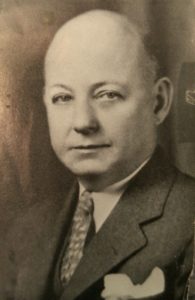
The traveling job ensured he would be gone much of the time, so Edwina and her children stayed at her parents’ house, where life was quite pleasant. Time spent with Cornelius, however, was anything but pleasant. He had an explosive temper that didn’t take much to set off. He bullied his family27)Dear Digital Dramaturg. 2019. “Businessman and Bully: Cornelius Coffin “C.C.” Williams.” Dear Digital Dramaturg. Feb 20. and put young Thomas Lanier (Tennessee) through psychological and emotional torture. Cornelius’s young son was more interested in reading, writing, plays, movies, and acting – concentrations that were seen as less macho in a Southern man – so he often taunted and teased Tennessee by calling him names like “sissy,” or “Nancy.”28)Dear Digital Dramaturg. 2019. “Businessman and Bully: Cornelius Coffin “C.C.” Williams.” Dear Digital Dramaturg. Feb 20. I would venture to say Cornelius was the kind of husband who didn’t want children because Edwina’s attention turned more toward the little tykes than to him. He saw them as inexorable competition. His death certificate lists the cause of death as “coronary thrombosis (presumptive) due to heart disease due to generalized arteriosclerosis.” He is buried with his grandfather and father at the Old Gray Cemetery, Knoxville.
Tennessee Williams’ life was certainly successful – filled to the brim. Yet, he also struggled with depression, alcoholism, drug addiction, loneliness, and his sexuality. His sister, Rose, was diagnosed with schizophrenia quite young, and received a lobotomy. Consequently, she was institutionalized until Williams had enough money for a private hospital. Some say his sister’s lobotomy caused him to pick up drinking. One might say that he, too, took up the vices of his grandfather and father. What cannot be denied, though, is his incredible talent – for writing, for storytelling, and for being.
**Featured image from Roxy Cinema
References
| ↑1 | Williams, Tennessee. 1986. Conversations With Tennessee Williams. Edited by Albert J. Devlin. Jackson: University Press of Mississippi. p. 16 |
|---|---|
| ↑2 | Leverich, Lyle. 1995. Tom: The Unknown Tennessee Williams. New York: Crown Publishers, Inc., p. x |
| ↑3 | Special Staff of Writers. 1919. History of North Carolina Vol. 6 North Caroliina Biography. Chicago: The Lewis Publishing Company., p. 243 |
| ↑4 | Ray, Worth S. 1956. Colonial Granville County and Its People: Loose Leaves from “The Lost Tribes of North Carolina”. Baltimore: Southern Book Company. p. 238 |
| ↑5 | Knoxville was named after George Washington’s Sec. of War, Henry Knox. |
| ↑6, ↑7 | Uncertain. 2000. “Descendants of Adam White.” tngenweb.org. Feb 1. p. 84 |
| ↑8, ↑12 | Williams, Scott K. nd. “Early Descendants of John Williams, “The Wealthy Welshman”.” kitwilliams.com. Accessed June 2021. |
| ↑9 | Heiskell, S. G. 1918. Andrew Jackson and Early Tennessee History. Knoxville: Ambrose Printing Company. p. 355 |
| ↑10 | Heiskell, S. G. 1918. Andrew Jackson and Early Tennessee History. Knoxville: Ambrose Printing Company.p. 358 |
| ↑11 | Heiskell, S. G. 1918. Andrew Jackson and Early Tennessee History. Knoxville: Ambrose Printing Company. p. 356 |
| ↑13, ↑14 | Heiskell, S. G. 1918. Andrew Jackson and Early Tennessee History. Knoxville: Ambrose Printing Company. p. 359 |
| ↑15 | Uncertain. 2000. “Descendants of Adam White.” tngenweb.org. Feb 1. |
| ↑16 | East Tennessee Convention. 1861. Proceedings of the E. T. Convention. Knoxville/ Greeneville: H. Barry’s Book and Job Office, May – June May 30-31/ June 17. |
| ↑17 | Humes, Thomas William. 1888. The Loyal Mountaineers of Tennessee. Knoxville: Ogden Brothers & Company. p. 347 |
| ↑18, ↑19, ↑21 | Leverich, Lyle. 1995. Tom: The Unknown Tennessee Williams. New York: Crown Publishers, Inc. p. 29 |
| ↑20 | Leverich, Lyle. 1995. Tom: The Unknown Tennessee Williams. New York: Crown Publishers, Inc. p. 32 |
| ↑22, ↑24 | Leverich, Lyle. 1995. Tom: The Unknown Tennessee Williams. New York: Crown Publishers, Inc. p. 28 |
| ↑23 | Leverich, Lyle. 1995. Tom: The Unknown Tennessee Williams. New York: Crown Publishers, Inc. p. 35 |
| ↑25 | Leverich, Lyle. 1995. Tom: The Unknown Tennessee Williams. New York: Crown Publishers, Inc. p. 31-32 |
| ↑26 | Leverich, Lyle. 1995. Tom: The Unknown Tennessee Williams. New York: Crown Publishers, Inc. p. 34 |
| ↑27, ↑28 | Dear Digital Dramaturg. 2019. “Businessman and Bully: Cornelius Coffin “C.C.” Williams.” Dear Digital Dramaturg. Feb 20. |
